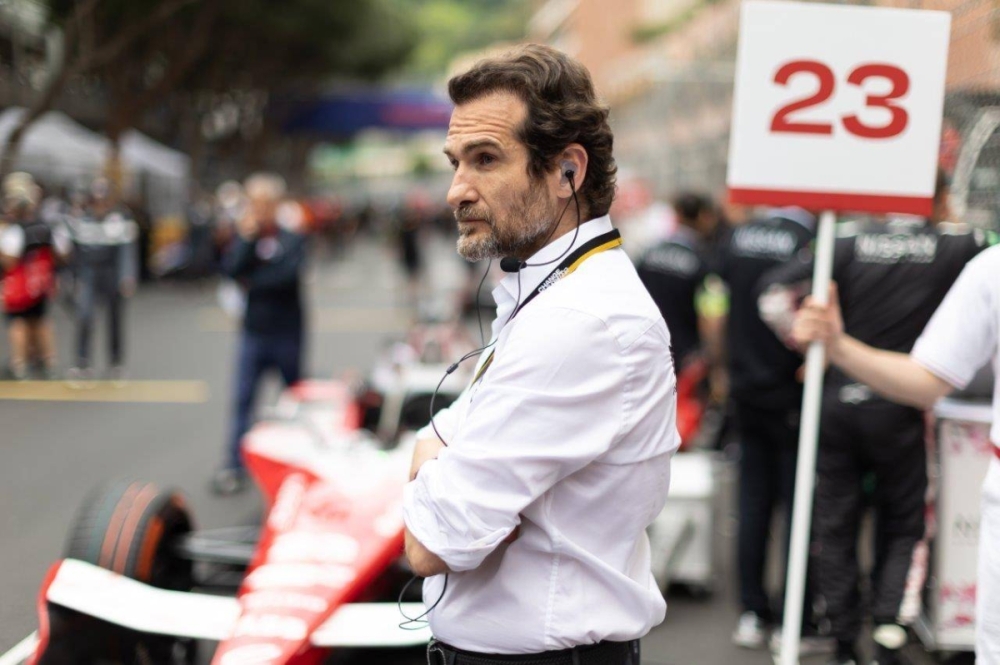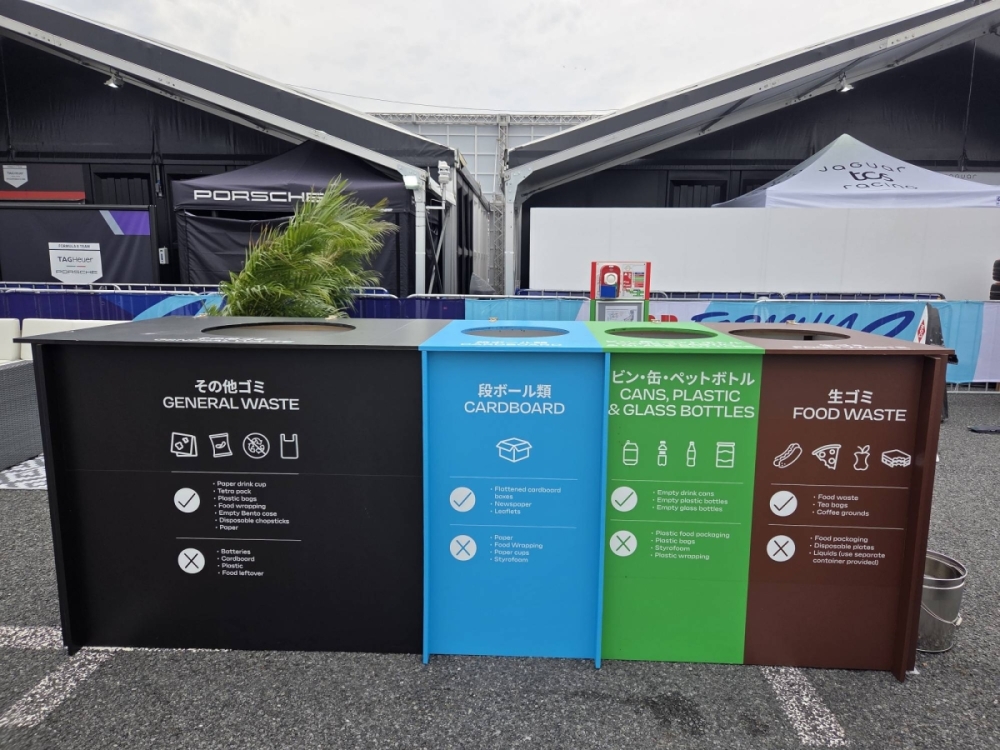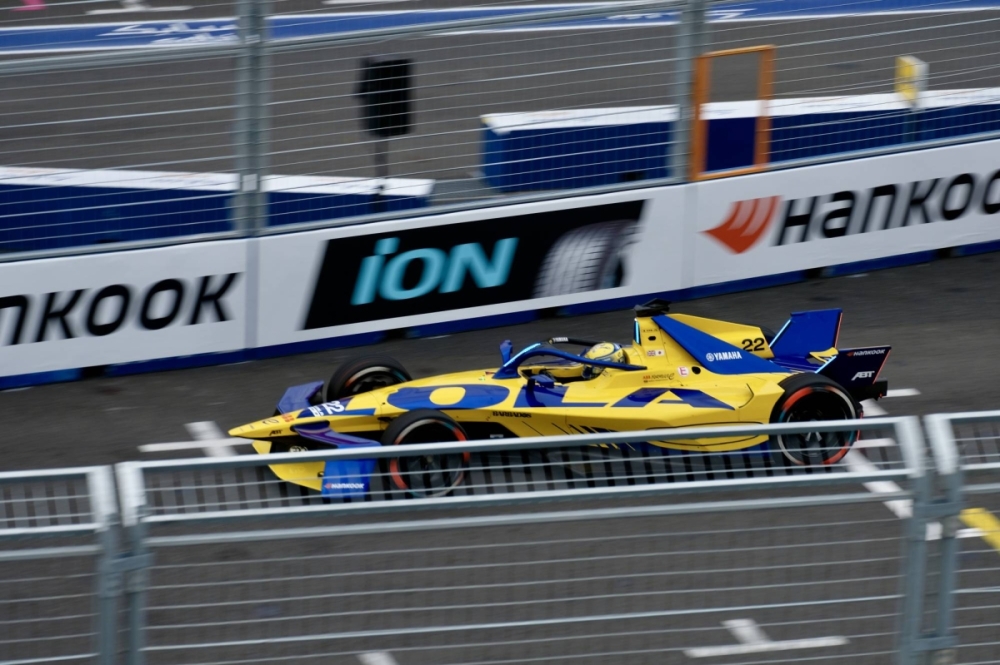For Formula E, 'sustainability is at the heart'
In the world of professional sports, winning is everything.
But Formula E, which hosted the second Tokyo E-Prix this weekend at Tokyo Big Sight, is a notable exception. Founded with a mission of promoting electric vehicles, Formula E has always placed sustainability at the forefront of its raison d’etre.
Now in its 11th season, those efforts are paying off.
Since its fifth season, Formula E’s carbon emissions per race have dropped by 41% thanks to improved efficiency, and the series is on track to meet its science-based targets in line with keeping global temperature rise to 1.5 degrees Celsius above pre-industrial levels. In 2020, it became one of the first major sports organizations to reach net zero and is one of the best-performing sporting organizations in the area of sustainability.
“We’ve accepted since the get-go that Formula E is not single-minded, but actually like a bicycle organization,” said Julia Palle, Formula E’s vice president of sustainability.
“We're using, in essence, the platform of motorsport, but sustainability is at the heart. It runs through the vein of the organization.”
Drivers don’t reach elite levels of motorsport without being ultracompetitive and Formula E’s 22 drivers are no exception. Among that number are former Formula One drivers like Saturday’s race winner Stoffel Vandoorne, Jean-Eric Vergne and Sebastian Buemi, who is also a four-time World Endurance Championship champion with Toyota Gazoo Racing.
So to create a championship with a twin focus of competition and sustainability was no easy feat, and it didn’t happen overnight.
“It takes time to build a culture,” Palle said. “It definitely took us a good couple of seasons before we could sense that the culture was really implemented and running through not only Formula E as a business but also the ecosystem.”
“For the teams and the partners joining the series, obviously the electric element is very important and they understand that sustainability is at the core of the series.”
That jives with the sentiments of team bosses, who say that sustainability is never far from the forefront, even when championships and titles are on the line. That’s in large part because sustainable operations are not optional and are part of the rules and regulations that govern Formula E’s 11 teams.
“In some sports, winning is the most important thing and teams can self-destruct for the purpose of winning. They’ll do whatever it takes. But in Formula E, we do that but within the environment that we created,” said Sylvain Filippi, Envision Racing’s managing director.
“Everybody is aligned,” said Nissan team principal Tomasso Volpe about the team’s sustainability initiatives. “We give ourselves targets to improve in different (key performance indicators) year after year. And so far we have improved in all of them.”

Nissan team principal Tomasso Volpe says everybody in the team is aligned behind their sustainability initiatives. | Nissan Formula E Team
For the Yokohama-based electric car pioneer, the benefits of participating in Formula E go beyond promoting the brand to a large audience, with the tech developed for its race team often making its way into road cars. For example, the development of more efficient batteries for the race car has helped the company make major improvements in the battery life for its commercial vehicles.
Those kinds of improvements will become even more important in the coming years — by 2030, Nissan is aiming to have most of its car lineup be electric.
For a team not backed by a major automaker such as Envision Racing, which is owned by Chinese renewable energy firm Envision Energy, the purpose is a bit different and comes down to raising awareness about key technologies that can help improve the health of the planet.
“We’re not here to sell cars,” said Filippi. “We’re here to promote sustainability, fight against climate change and get people excited about solutions that will help the climate. That’s really what it’s all about.”
Global growth in electric vehicle sales has slowed, but experts are still optimistic about a continued rise in uptake in the coming years. In 2024, more than 20% of the new cars sold worldwide were electric, according to the International Energy Agency.

Waste disposal at the Tokyo E-Prix. Formula E has taken great strides to lower the carbon footprint of its race weekends, earning the sport plaudits for sustainability. | Joel Tansey
Growth has been particularly slow in Japan, where hybrid vehicles remain the far preferred option. Last year, sales of electric cars experienced their first decline in the country in four years, falling 33% to just under 60,000 cars.
For Palle, those headwinds only reinforce the sport’s mission to spread electrification to new markets, Japan included.
This year marked the second Tokyo E-Prix, and Tokyo Gov. Yuriko Koike noted the importance of building momentum toward net zero when the race was first announced in 2023.
“I think we're racing in Tokyo because we have this shared vision with the Tokyo Metropolitan Government of achieving the net-zero transition,” Palle said. “And so they are using us basically as a platform to support the EV campaign and the strategic approach that they are promoting to their citizens.”

Zane Maloney drives his Yamaha-powered Lola at Tokyo Big Sight on Friday during the first practice session for the Tokyo E-Prix. | Sam Byford
The opportunity of a home race was not lost on Nissan’s Volpe. Showcasing Nissan’s prowess in electrification for a home crowd was an exciting opportunity, particularly because this year’s event featured two races following strong ticket demand for the debut event in 2024.
“I hope that this big attendance helps to change the perception of electric vehicles,” he said. “Because when you see electric vehicles fast and racing ... we hope that this makes people consider electrification as a key technology to be excited about when they drive a normal car.”
Formula E scored 81 out of 100 in the 2023 Global Sustainability Benchmark in Sports (GSBS) report, tied with German soccer club Borussia Dortmund for the top spot. The average score within the sports industry was 47.
“Sustainability is literally lived in Formula E, and the entire team's dedication was felt throughout the audit process,” said GSBS CEO Christian Hartmann.
So beyond Formula E’s goal of influencing consumer habits, the sport also sees itself as a model for other organizations to follow.
“It's very important to keep in mind that in sustainability, there's no such thing as competition,” Palle said, adding that Formula E regularly shares its challenges and successes with other organizations.
“The reality is that every sport thinks it's very unique, so some things might not be able to be scaled up, but it's very, very clearly defined as part of our mission to share and evangelize whatever has been successful,” she said.










